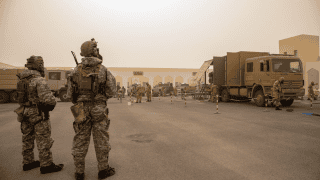- WIADOMOŚCI
How the Poles could Support the National Defence Efforts? Support for the Territorial Defence Component and Conscription [Survey by Defence24 and IBRIS]
Who should be responsible for defending the state, in circumstances of aggression? What is it that the citizens are ready to sacrifice to support the defence effort. Do they support the common military training? In what way are the threats to national security perceived? Replies to the questions above and similar ones have been provided by the respondents from Poland and from the Central European states, over the course of a survey conducted by Defence24 and IBRIS Market and Social Research Institute.
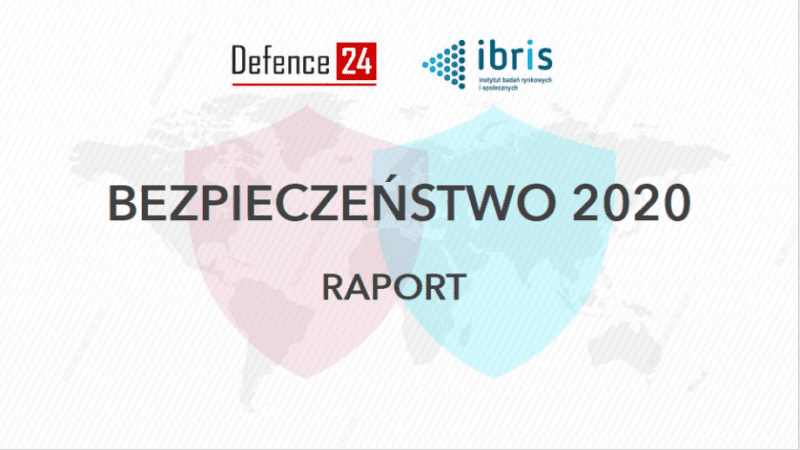
Download the report here (in Polish)
It was on 12th August in Warsaw, when the results of the research conducted by IBRIS and Defence24.pl were showcased, in front of high-ranked members of the administration, military commanders, experts, and journalists. The results of the public opinion survey were presented by
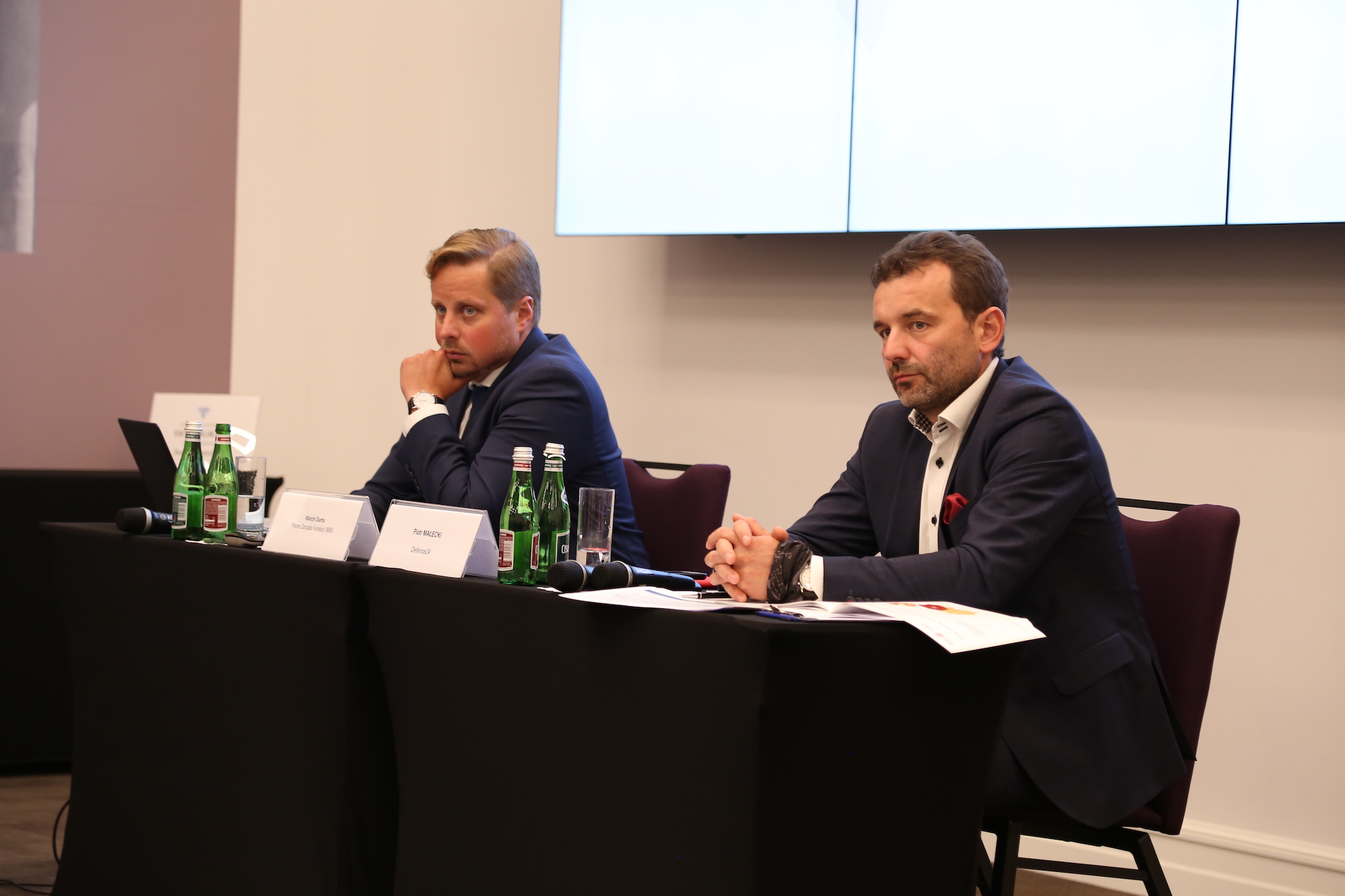
“The public opinion is a relevant nexus in the process of legitimizing the actions undertaken by the state, within the scope of defence-related activities. The knowledge of the attitude of the society in the sphere so crucial for the functioning of the state should contribute to a better comprehension of the needs of the Poles, and the level of security that they experience. Awareness and analysis of opinions emerging among the members of the society in the neighbouring states, concerning the critical, defence-related matters, altogether constitute knowledge that could be employed in establishing of external relationships”, the report authors stressed.
This matter has also been noted by the PM’s chief of staff, Michał Dworczyk, who attended the presentation.
Creating citizens’ self-responsibility is a matter of fundamental importance. Today it is more and more common for a demanding posture to dominate, with regard to the state. This is why we need to place our bets on the younger generation. Creating a pro-defence posture among the youth should be an important direction of our actions.
Research Summary
Should Poland be attacked by another state, almost 50% of its citizens would undertake an effort to provide safety for the relatives in the place of their residence. 36% of the respondents declare that they would report for duty in a military/paramilitary setting. Poland comes first, when it comes to willingness to fight, among the Central-Eastern European states. Estonians are ranked second, with 24% of the respondents declaring their active involvement in national defense. The German citizens are the least eager to act in this way - with just 11% declaring their willingness to get involved.
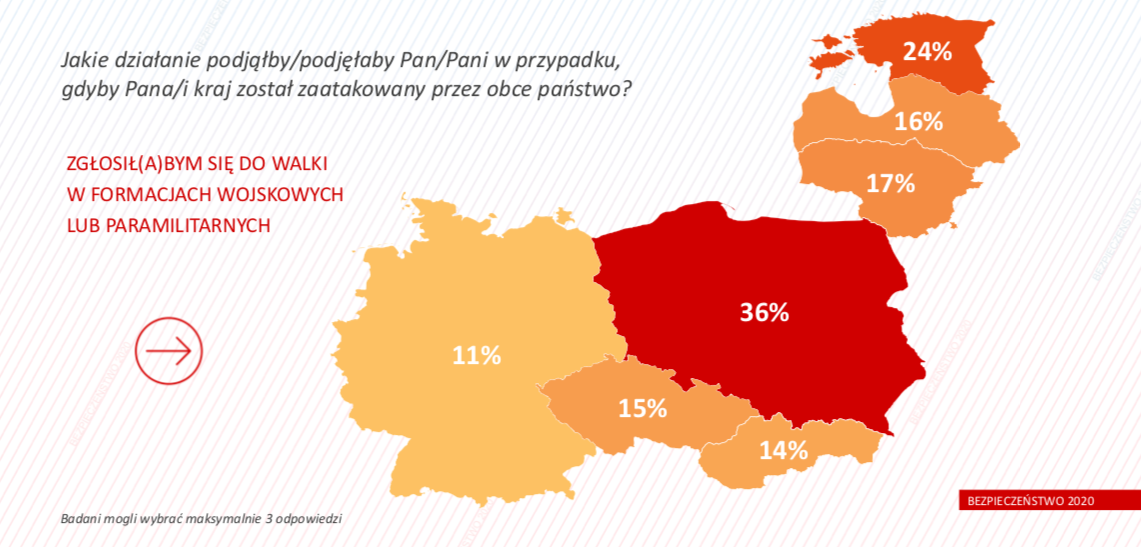
1/3 of the Poles declared their readiness to sacrifice their money for national defence. 26% of the respondents would be ready to sacrifice their lives - and this is the top result among the states surveyed. 22% of the Estonians and Slovaks, 20% of Latvians, 18% of Czech citizens, 16% of Lithuanians, and just 9% of Germans stated that they would be ready to sacrifice their lives in the fight.
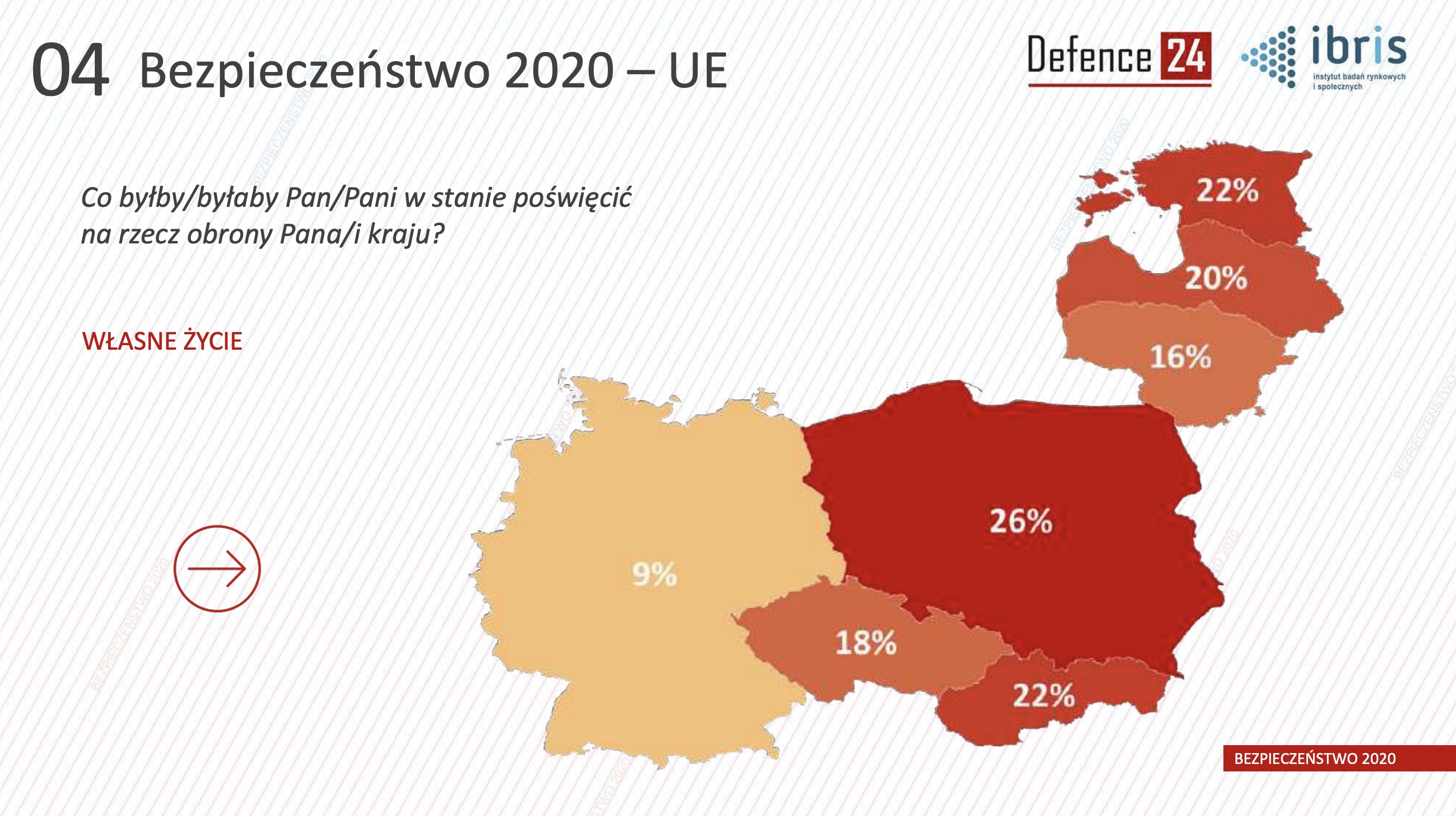
According to most of the Polish respondents (67%), the professionalized Armed Forces shall be responsible for defending the state. In the case of Germany, 85% of the respondents had the same opinion. 46% of the Estonians would assign the defensive duty to a professionalized military force.
The Lithuanians are worried most when it comes to the threats for the state - with 36% of the participants worried about that. Poland comes second, with 28% of the respondents making a declaration as such. Latvians also consider some nation to be a threat to the existence of the state, with 24% of the respondents providing an answer as such. For the sake of comparison, a little over 7% of the respondents have given the same answer in Germany.
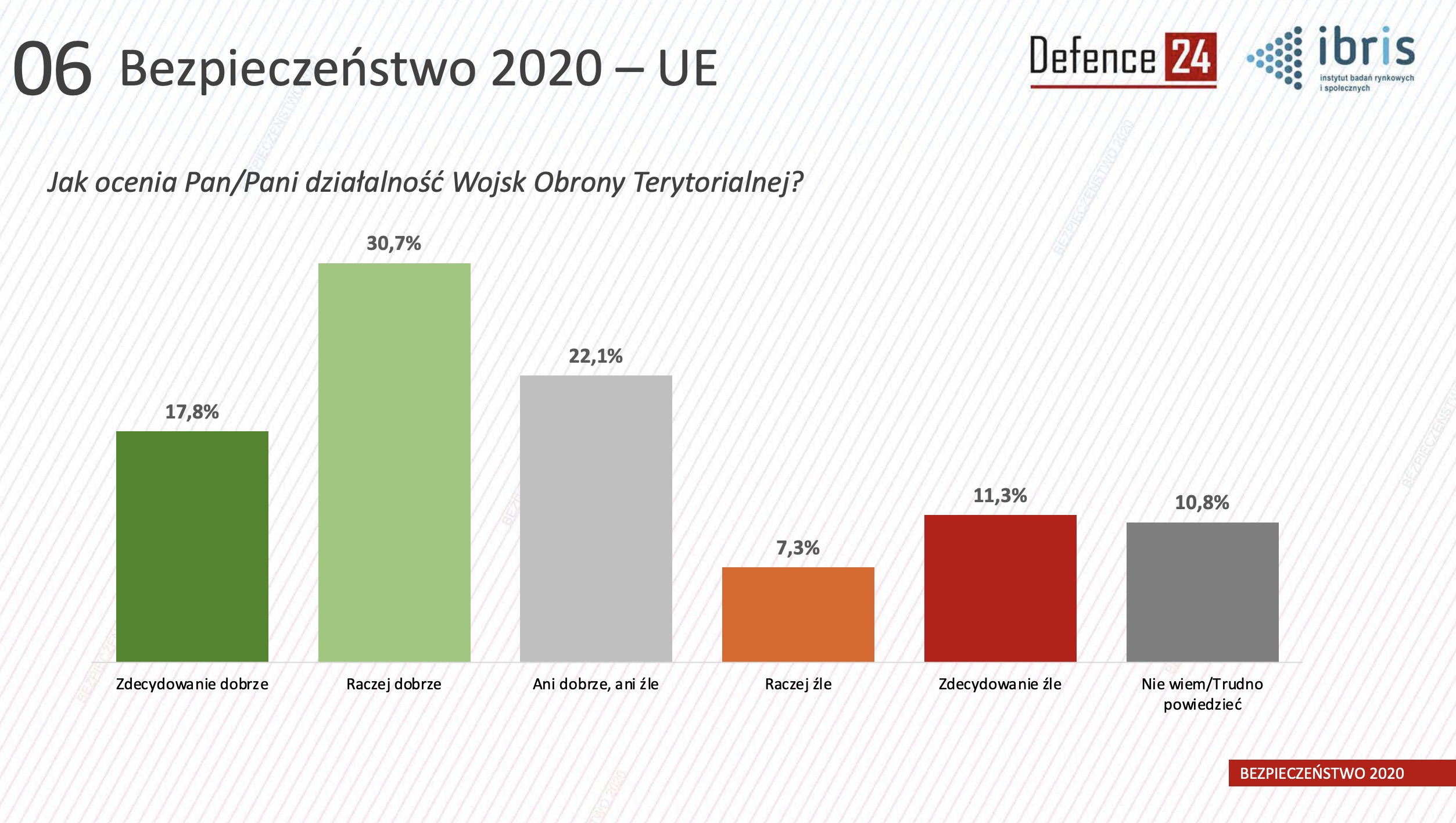
Considering the above, the report also checked the Poles’ endorsement of a potential return of compulsory military service, their interest in military training, and their assessment of the activities undertaken by the Territorial Defense units.
The Poles are evenly divided when it comes to compulsory military duty. 48% are for and 44% are against the duty. What is important, among the group that is supporting the reintroduction of common military training, more than 70% of the respondents claim that the training activities should last for a year or more.
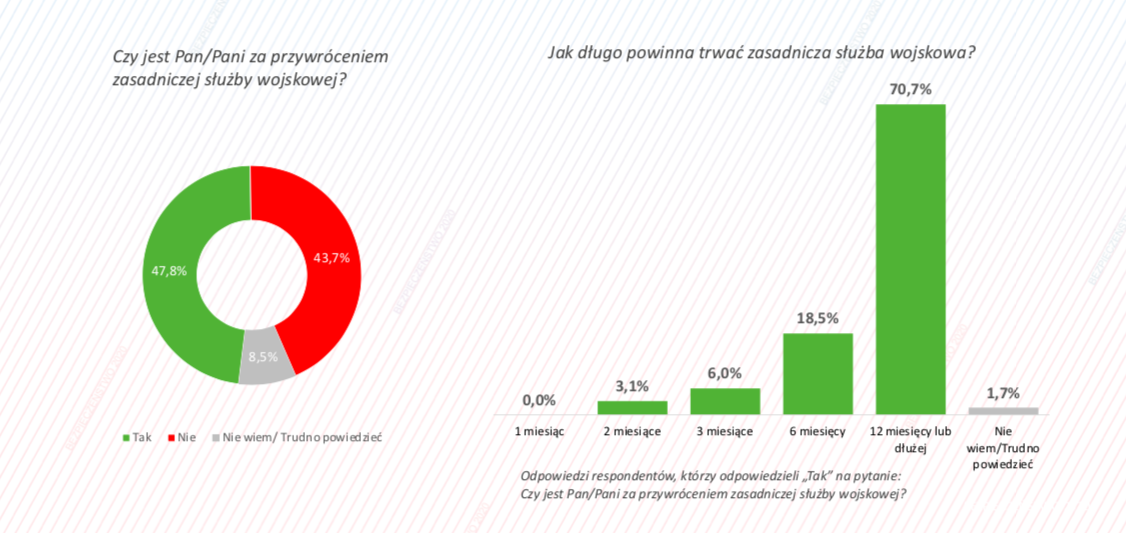
The division is even more pronounced in case of a response to a question of whether the Poles would be willing to engage in military training, should they have a chance to do so - an even number of 49% of the respondents provided a positive and negative answer here. Among the positive answers, a quarter would be willing to serve for more than a year, while a month has been defined as a sufficient period by 22%.
The report suggests that the activities undertaken by the Territorial Defence Component (WOT) are perceived positively by society. 49% of the Poles have an opinion on the component that is positive. Only 19% of the Poles negatively perceive the WOT’s activities.
The survey has shown that the Poles’ motivation to serve is altruistic - they want to help the others (22.4%), they have a feeling of a mission and they are willing to defend the Polish territory (12.6%) and they want to serve the state (12.6%). The least attractive factors include the ability to participate in military operations (0.6%) and the possibility to begin a military career (0.8%).
Work in the military also has some disadvantages, with long separation from the family being the primary factor discouraging the respondents from this career path (30.4%). One-fourth of the Poles are afraid of potential injuries, 28% are worried about the potential high levels of stress.
Defence Awareness and Readiness - Key Factors in Counteracting the Threats
Referring to the results of the survey, Secretary of State at the MoD, Wojciech Skurkiewicz, said that an important role is played by the education of the youth when it comes to the defence matters.
We are engaged in an effort, undertaken jointly with the Ministry of Education, to significantly modify or even reform the “Education for Security” subject curriculum. Today we are dealing with a dynamic evolution of threats, and this should be followed by teaching at schools, related to the matters of security and defence. The young people expect something modern today, that could inspire them to exhibit patriotic behaviors and pro-defence stance. The new curriculum should constitute a response to that requirement
Michał Dworczyk said that Poland should follow the footsteps of France and introduce short-term service as a complementary element of pro-defence education.
The young people should identify themselves with the obligatory service for the state as early, as during their schoolyears. Not only are actions by the Polish Ministry of Defence and the military required here, as the educational curricula shall also be properly adopted. In my opinion, the training and the establishment of a pro-defence stance at the stage of high school and university education should also be complemented with a common state service form, for a short period - in the military, healthcare, or in the uniformed services. Other nations, such as France, have implemented solutions as such already. We should analyze possibilities as such as well.
Div. Gen. ret. Leon Komornicki, former Deputy Chief of the General Staff stressed that the threat awareness among the citizens and their readiness to make sacrifices both constitute key elements of the national defense system.
“Security 2020” is an important element of discussion covering the matters of Polish defence and security. I would like to thank the Defence24 Group and the IBRIS institute for preparing this project. The pro-defence posture among the members of the society would be decisive for the level of national security as a whole. Alongside the professionalized armed forces and the whole national security system, the national awareness of threats and readiness to defend the homeland are the key nexus here.
About the Project
“Security 2020” (“Bezpieczeństwo 2020”) is a joint undertaking by IBRIS and Defence24. Its goal was and is to identify the patriotic and pro-defence stances exhibited by the Poles and by the societies of other states in the region. Identifying the stance of the citizens within the scope of patriotism, or the stance they would adopt facing a conflict plays a huge role in the planning of the future actions aimed at optimizing the national defence. The first survey as such took place back in 2016 after Crimea was annexed by Russia and during the fight against ISIS in Iraq. In 2020 Poland is celebrating one of the most important battles in history - the Battle of Warsaw (1920). It is a perfect moment to conduct a new social analysis in the national security domain.
The project has been enriched with surveys conducted among the societies of the neighbouring nations - Germany, the Czech Republic, Slovakia, Lithuania, Latvia, and Estonia.
The scope of the research, outside Poland, also covered issues as follows:
- Who should be responsible for defending the territory?
- What actions would the citizens undertake, should the given country be attacked?
- What the specific societies would be willing to sacrifice, for defending the state?
Specific Objectives
- Defining the level of responsibility the Poles exhibit, for national defence;
- Uncovering the opinion the society has on compulsory military service;
- Defining the stance the Poles exhibit towards NATO;
- Identifying the level of awareness on conventional and new forms of international conflicts;
- Identifying the profile of a contemporary Polish patriot;
- Defining the level of national security awareness, information security included;
- Identifying the potential declared reactions of the citizens, to a potential armed conflict;
- Defining the most effective promotional activities, within the scope of national defense;
- Identifying the social posture, when it comes to the military elements that shall be responsible for defending the territory of Poland to the greatest extent;
- Unveiling the activity declarations made by the citizens who would potentially face an attack on the state in which they live;
- Getting to know the declarations made by the societies when it comes to the scale of their devotion for national defense;
- Analysis of pro-security stance in Poland, Germany, Czech Republic, Slovakia, Lithuania, Latvia, and Estonia.
WB Group has been the “Security 2020” project partner.















